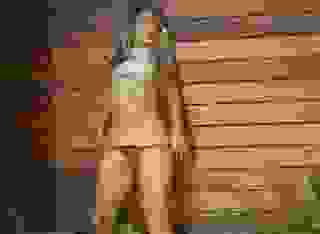- BDSM
- The Professor Day 09: Committment
Note: You can change font size, font face, and turn on dark mode by clicking the "A" icon tab in the Story Info Box.
You can temporarily switch back to a Classic Literotica® experience during our ongoing public Beta testing. Please consider leaving feedback on issues you experience or suggest improvements.
Click hereThe Professor
Recap: Molly has approached her former professor on whom she has a deep crush. They exchange stories to explore their fantasies and philosophies as he attempts to rein in her emotions.
Saturday, Day 9 Commitment
Saturday was another gray and rainy day. Stephen took Molly to her apartment to see the progress on renovations. Against all odds and expectations, the painters were just finishing and cleaning up.
"It looks like you can move back in tomorrow."
"That's too bad. But I need to start my job Monday, so it's good if I can settle in."
"You're going to be working in a law office. Do you have clothes for it?"
"You have seen pretty much all I have."
Stephen shook his head. "Looks like you need a shopping trip. I'll be glad to help out."
He took her to a discount store where she bought a minimal wardrobe. She promised herself to do better when she got a paycheck. As they left the store and headed for his car, she stepped in a puddle.
"Damn."
"What's wrong?"
"I just got water in my boot." She held up her foot and saw that the leather had parted from the sole. "They were cheap."
"Looks like we have another stop to make. There is an outlet store across the street."
Molly looked over the selection of dress boots, concerned she would not be able to afford any of them. Then her eye lit on a pair of thigh boots with high heels. "Look prof," she said quietly, "They made these for you."
Stephen laughed, but didn't deny it.
"Let me try them on. Just for you."
She found her size and zipped them up her legs. She dropped the hem of her mid-length skirt and walked about the store. When no one was looking, she pulled up the skirt so Stephen could admire them. She saw that she had his attention.
"They actually feel great, but I can't afford these either," she confessed.
"Do you want them?"
"Yes, but. . . "
"I haven't given you a graduation present yet. I was thinking of something more practical, but . . ."
"Only on one condition. Tomorrow I move out. I would need to know that I could wear them for you sometime."
"I think there will be lots of opportunities for that."
"That is what I was hoping you would say."
That evening Molly read her paper on commitment. "War," she began.
"War?"
"That's the title. War is just the context."
"Continue."
War
Althea was just three, barely weaned, when her brother killed her mother by not wanting to be born. She was raised by her father, the village tailor. She learned from him to make dream coats out of whole cloth and to make tunics and leggings from rags - saving the best parts, trimming and discarding the worn threads. Unfortunately, nearly everyone in the poverty-stricken village had to make do with their own meager skills, and her father mostly provided services for special occasions, such as weddings and funerals; but the population was dwindling and there were too few of the latter and not enough of the former. Were it not for occasional commissions from the only two wealthy households - the nobleman at the big house and the landlord - they would have starved.
Althea was her father's life, his pride and joy. He sheltered her from the world, and she was happy just to be in the center of his. At seventeen, she was coming into the bloom of her womanhood when he died of his chronic cough. The villagers respected him and gave him a proper send-off, but Althea was now alone. The day after the burial the landlord stopped by her shop. "I'm sorry about your father," he began. "Are you aware that before he died we had come to an agreement? He wanted most of all to know that you would be taken care of. I promised him that I would take you into my household, and since my wife died four years ago . . ."
Althea wasn't sure whether he was proposing that she become his wife or his mistress, but the thought of sharing a bed with this lecherous old man - he must be over forty and had bad teeth and repulsive breath - repelled her. He was lecherous and cruel. She vaguely remembered some town gossip that he used to beat he wife. "He didn't mention anything of the sort." How could my father even have thought it? Yet he must have known he was dying. Why had he not spoken to her about her future? "Please give me some time."
"What else can you do?"
"I had expected to carry on his business. I can sew as well as he."
"Perhaps you also don't know that he owed me eight months rent. I promised to forgive it when I married you. We signed a contract."
"What do you mean?"
"A marriage contract. You are legally pledged to me."
"But I knew nothing about it."
"That doesn't matter. It was your father's wish. And I promise to take good care of you and your children."
"He just died. This is not a time to speak of a wedding. I must have time to grieve."
"I understand. We will talk later. Suppose I come back in a week?"
Her father sold her? This could not have happened. He would never do anything like that. But what could she do? The man must have forged a contract and bribed witnesses. There was no one to help her. It occurred to Althea that it would be better if she had already married. More than one man had asked for her. Her father had done nothing to encourage them and Althea herself had protested that she did not want to be married. It was too late now. But why did I never consider anyone before? The image of the landlord taking care of her children sent chills through her. He beat his wife. No, not just his wife. When Althea was a child, he had had a slave girl a little older than she. Images came back to her of his shouts and the girl's screams. He seemed to be angry with her all the time. One afternoon the slave came to her father's shop to hide from her master. She had bruises on her face, and through her torn dress, Althea had seen welts on her back. Soon the landlord had come and dragged her away. Shortly afterwards, she disappeared. No one knew whether she had run away or had died. Althea had not thought about the slave girl for years. She had not really understood what she witnessed before now, but that episode made her hate and fear men.
Althea now had a few days in which to make plans. Despite having friends in the village, she could not stay. Before the week was out, she would have to flee. She hurriedly completed a few garments that were nearly done. She bundled these up with her father's tools, usable cloth, and whatever money and food she could find. She found his dagger and secreted it in her own clothing. Then she slipped out of the village in the dark of early morning. But where to go? She had never traveled before, not even within the duchy of Swalia. She only knew of one city by name, Grossburg, somewhere along the highway to the east. That had to be her destination. If she could set up a shop in the city, she would find a way to survive.
Once she set out, Althea instinctively avoided the open road. She preferred to walk in the woods alongside the road where she could easily hide from strangers, but not lose her way. When she had to be seen, she covered her head with a ragged shawl to look like an old woman and affected a weak, unsteady gait. She slept in haystacks or barns. A few times she bartered or sold from her meager supply of clothing for food.
After a week, she sensed she was nearing the city. The number of travelers in the opposite direction was increasing. Many of them were families driving or pushing carts piled with their belongings. Deciding it was safe to speak to a family with children, Althea approached them for news.
"Grossburg is under siege," they told her. The duke had foolishly provoked the neighboring barons and now the attacking armies were too strong. Residents who had families in the country were fleeing the conflict.
Not having any other ideas on where to go, Althea stayed where she was. She began looking carefully at the refugees, but didn't dare to speak to them. She spent the night on the floor of an empty shed. In the morning the number of refugees had grown to a constant stream. Some were excited; others appeared stunned into silence.
"What news?" she asked.
"They've overrun Grossburg. It's horrible. I saw them kill children. They are murdering and raping everyone. The put the women in chains and dragged them off as slaves."
Althea knew now she must make other plans and turned back. Travelling alone and with only a small bundle, she moved faster than the others and soon found herself walking with a band of about 30 townspeople. A dozen of them appeared to be soldiers armed with swords or pikes. The rest were women and children. She exchanged greetings with a young woman her own age, named Letta, and pumped her for details. Letta described the Endorean soldiers as fierce and heartless. She told of one atrocity after another - children being hanged, men burned alive in a church, women raped and tortured. A pregnant woman had had her baby cut out. Another woman was forced to kill her own infant children and then dragged off as a slave. Every household was looted. Of course, Letta had not seen these horrors for herself, but she had heard others tell them.
Althea felt for her father's dagger still hidden under her cloak. She vowed to kill herself before she would allow an Endoran to touch her.
By late afternoon, the band of refugees was plodding slowly in open country. They had seemingly left the crowd far behind and paused to rest. Suddenly a cry went up. One of the soldiers had seen a cloud of dust behind them. "Horses!" After a brief consultation, they hurried a short distance ahead to where the road narrowed and passed between two rocky outcroppings. The women and children were placed out of sight of the road behind the outcropping on the left, while the men set up an ambush.
From behind the rocks, Althea and the others waited in silence. Soon the drumming of the horse's hooves was heard and gradually grew louder. It seemed like an eternity as the horses came closer and closer. The fight itself was over in minutes. She heard the whinnies of horses, the clash of steel, a number of inarticulate cries, and then silence. No one dared stir or whisper.
An armed man walked around the rock. "Over here!" he cried. Soon a score of Endorean soldiers appeared, some leading horses. When they saw only unarmed civilians, they lowered their weapons and began reaching for the women. "Everyone out," called a man with an accent. Some of the mothers cowered with their children; a few tried to run for it. Althea moved off to the side as the screams began. She saw a soldier hack at an eight-year old boy with his sword. Another pushed a woman to the ground and pulled at her skirts.
Althea pulled the shawl further over her head and tried to walk inconspicuously away from what she saw. A soldier appeared in front of her laughing. "You're mine," he said, and pointed his sword at her. She drew her dagger and made as though to defend herself. He smiled. This was sport for him. As he took a step toward he, a strong arm seized her wrist from behind. She looked up to see another soldier with his sword drawn, but pointed at the first one. "She's not yours," he said calmly. The first soldier began to protest, then backed down. Then he turned back into the melee to find another woman before they were all taken.
When her captor eased his grip, Althea turned the dagger toward her own ribcage. Before she could act, it was wrenched from her hand. She tried to pull away, but he shoved her to the ground and tied her hands before her with a short length of rope. "You will not die in my presence." He said those words with the certainty that she was no longer in control of her life.
With a tug on her arm, he pulled her to her feet and walked her across the road to the other outcrop. He pointed toward the ground and Althea understood he was going to take her there, but he only sat beside her and said nothing. Behind them the screams and grunts continued for a while, but eventually subsided into sobs of grief and pain. Men began gathering their horses.
Althea looked at the road. She saw the bodies of the men who had tried to protect the women. How foolish they had been. They may have killed one or two of the enemy, but had no chance against horsemen. If they had only hidden themselves, perhaps no one would have died, the children would be safe. The soldiers mounted their horses and fell into line. There were about twenty of them. She counted four, no, five sobbing women dragged onto the horses of their captors. One was bleeding between her legs, another from a wound in her side. She found a lead rope being tied around her own bound wrists and was startled to be reminded that she was not merely a spectator. As the horses set out at a slow pace, she was forced to walk behind.
After an hour, the column stopped to make camp near a stream. Her captor led her to the edge of the circle of men and threw a blanket onto the ground. He removed the saddle and a pack and left Althea standing while he watered his horse and let it to pasture. Then he turned to her impatiently and said, "Gather some firewood." Just as abruptly he turned his back. She walked toward some nearby trees and began picking up dead branches. With her hands still bound, it took her many trips before she had enough for him to acknowledge.
Darkness was coming on quickly as he lit the fire. He sat facing it, his back to the camp. As Althea sat beside him, he scarcely reacted to her presence. He pulled a loaf for bread and wedge of cheese from his bag and broke off two equal portions of each. He indicated to Althea that she should take her dinner, but no sooner had she raised the bread to her mouth than he gave her a bag and told her to get water.
She walked to the stream and saw Letta sitting next to a soldier. Her dress was torn and her bare legs lay on the grass. She was crying. Her captor was eating and talking with another man. Letta reached for some bread, but the soldier, not noticing, picked it up and began to eat it. Clearly he had given Letta nothing to eat.
Althea returned with the water bag. As her captor hung it over the fire, she picked up her food and took it to Letta. Letta received it without a word and began to stuff it in her mouth. Then her soldier noticed Althea and rose toward her. Before she could turn, he seized her arm. Just as abruptly he released it and stepped back, his eyes looking over her shoulder. Althea turned and saw her master standing ten paces away, glaring at the rival. She returned to his fire and sat. Without a word, he handed her the remains of his own meal.
After she had eaten and drunk some tea, she gestured that she needed to relieve herself. Althea wondered why she was afraid to speak to him. Was it because he did not speak himself? He unbound her hands.
On her return, she held out her hands expecting him to tie them again, but he was already laying out a blanket. Her hands seemed of no interest to him. He gestured for her to lie near the fire and stretched himself out behind her. She did not want to share the blanket and moved closer to the fire.
As she fell asleep, she was awakened by a brief scream from one of the women. She heard other sounds of sex in the camp. Soon there were no sounds at all. She wondered why he had not molested her. Why did he take her at all? She could only assume he wanted her as a slave. It was a small comfort to know he did not intend to kill her, but the prospect of being a slave seemed no better.
The next time she awoke the fire was nearly dead. She was shivering and her bladder was full. Her captor was asleep. She felt for some sticks and placed them on the coals. As the fire returned, she walked to the wood to relieve herself. He was still asleep when she returned. She sat at the fire for a while and decided to leave. She began to walk away, half expecting someone to stop her; but no one did. She crossed the stream and continued away from the camp.
At daylight she found herself near a road and followed it wherever it led. She saw no one. The landscape seemed deserted and some of the houses burned. By noon, she was hungry and faint. She sat on a rock to rest and did not want to stand again. Gazing down the road she had come, she saw a lone horseman walking unhurriedly toward her. She knew who it was before she could see him clearly. She did not try to run, or hide. She did not even wonder if he had seen her. She just waited. When he reached her, he merely said, "It is not yet safe." She allowed herself to be lifted onto the horse behind him and said nothing as he turned back to rejoin his troop.
They caught up as the horsemen were making camp for the evening. Althea noticed she was the only woman now. She was afraid to allow herself to wonder what happened to Letta. She gathered wood for the fire and water this time without prodding. As they drank their tea, she overcame her irrational fear and spoke to him for the first time. "What is your name?"
"Salamon."
"Mine is Althea."
He grunted.
"Tell me about yourself."
He said nothing.
"Do you live in a city? Are you rich? Do you have a trade? How many men have you killed?" Her questions came faster and nonsensical as her frustration at his silence mounted. "What do you eat at home? How big is your house? Do you have a dog? What colors do you like? How do you treat your slaves? Why . . ."
"As they deserve."
Her mouth hung open until she remembered to close it.
That night it grew chilly. She allowed him to lie close enough to her to cover them both with the blanket. She pictured him beating his slaves. Did he rape them also? She wondered what he would do to her if she tried to walk away again? Would he bind her or let her go? Where were they going, anyway? And as she pondered what tomorrow would bring, she no longer worried about next month or next year.
For three days the horsemen followed the roads. It seemed to Althea they were making a grand circle across an empty countryside. Twice they encountered a village or isolated homestead, and they plundered them. The only person they encountered was an old woman, whom they left alone, at first. As they rode away, however, she saw two stragglers argue with her and then strike her. Salamon was a taciturn with his comrades as he was with her. More so. He seemed to view them like children who must be tolerated. When they looted a homestead, he simply waited until they were done. When they became drunk, he merely kept his distance. When they led a women off the path and raped her in sequence, he distanced himself from them. They avoided him with respect, like a dangerous animal who would leave them alone if they did not provoke him.
After that first day, he never tied her hands. At least he tolerated her occasional questions. She learned he owned a farm; that he had never been in her country before. He seemed to enjoy watching the sunset. But whenever she asked about his family, he would turn away and not say a word.
As much he ignored her, she knew he was always aware of her and began to appreciate that he offered her what comforts he could. He always shared his food and offered her the warmth of the fire. He sometimes allowed her to ride. Most importantly, his presence caused the other men to leave her alone. Little was expected of her except to set up camp. She volunteered to mend his torn tunic and cloak.
One morning, the fifth since Salamon had taken her, the soldiers took longer to get started. They spoke more quietly. Many of them took time to sharpen their swords. Althea felt the tension that told her they expected trouble. Once they set out, the horses were held to a slow pace to keep them rested and the riders stayed closer together. There were no stragglers. In the midafternoon, they crested a hill and paused. Below them the road led directly to a small town along a river. The houses were made of stone and set densely together. Although there was no castle, the houses on the outside were attached to form a defensive wall. She could not see any movement below. She understood that in the town was a bridge, and that it must be the only river crossing available. The men had to pass through, but sensed the danger.








